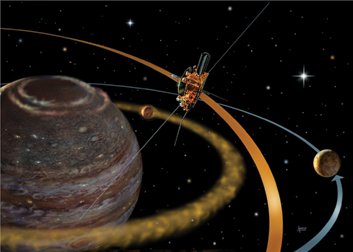Intruder Alert: Sweeping Space for Dust
The solar system is filling up with stardust three times faster than it was 6 years ago.
Share this:
- Share via email (Opens in new window) Email
- Click to share on Facebook (Opens in new window) Facebook
- Click to share on X (Opens in new window) X
- Click to share on Pinterest (Opens in new window) Pinterest
- Click to share on Reddit (Opens in new window) Reddit
- Share to Google Classroom (Opens in new window) Google Classroom
- Click to print (Opens in new window) Print
By Emily Sohn
If you can’t believe how quickly your bedroom becomes dusty, you should get a load of the solar system. A space probe cruising past the sun has found that the solar system is filling up with dust three times faster than it was 6 years ago.
While dead skin and fluff from clothes account for most of the dust in your bedroom, the solar system’s dust is coming from other stars in our galaxy.
 |
|
Artist’s view of the Ulysses spacecraft, which has flown over the sun’s poles. |
| European Space Agency |
Sunlight gives the dust an electric charge as it drifts into the solar system. The sun itself acts like a giant magnet, and its magnetic field normally bounces the charged dust particles back out of the solar system.
But lately the sun’s magnetic field has been behaving differently. Instead of deflecting stardust, the sun has been letting it hang around.
Astronomers say that the dust is more important than we might think because it can absorb starlight and it brings such elements as iron and carbon into the solar system.
At the same time, however, the dust is nothing for us to worry about. The particles are too tiny to interfere with the planets, but there would be more collisions of dust particles with comets and asteroids than usual, resulting in some additional debris.
And the solar system looks set to become even more dusty. The amount of dust sneaking in could triple by 2010. It sounds like space will need a vacuum cleaner!—S. McDonagh
Going Deeper:
Cowen, Ron. 2003. It’s raining stardust: Spacecraft measures record amount of stellar debris. Science News 164(Aug. 23):115-116. Available at http://www.sciencenews.org/20030823/fob2.asp .
Sohn, Emily. 2003. Sky dust keeps falling on your head. Science News for Kids (Aug. 13). Available at http://www.sciencenewsforkids.org/articles/20030813/Feature1.asp .
You can learn more about the Ulysses space probe at http://ulysses.jpl.nasa.gov/ .






